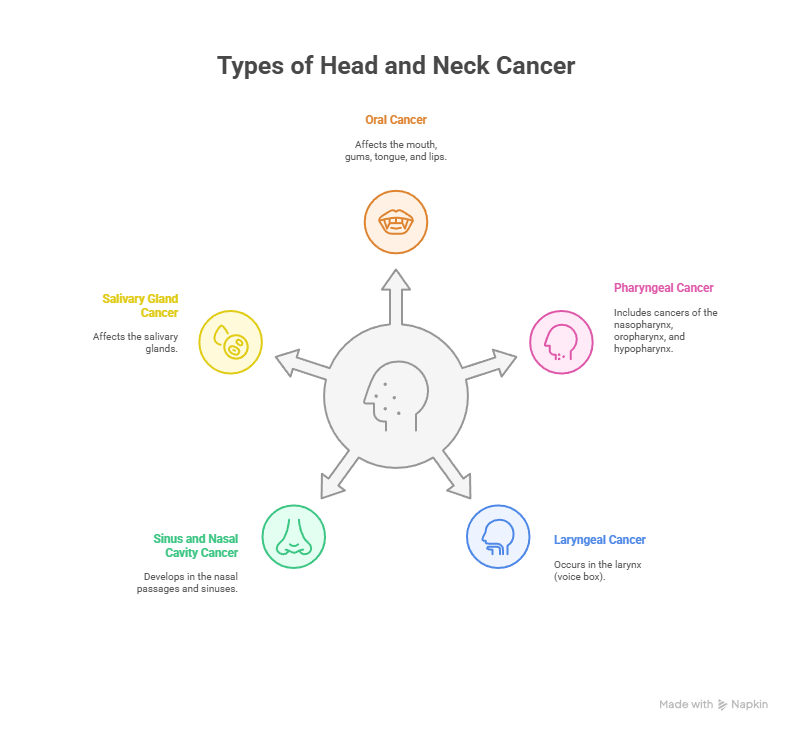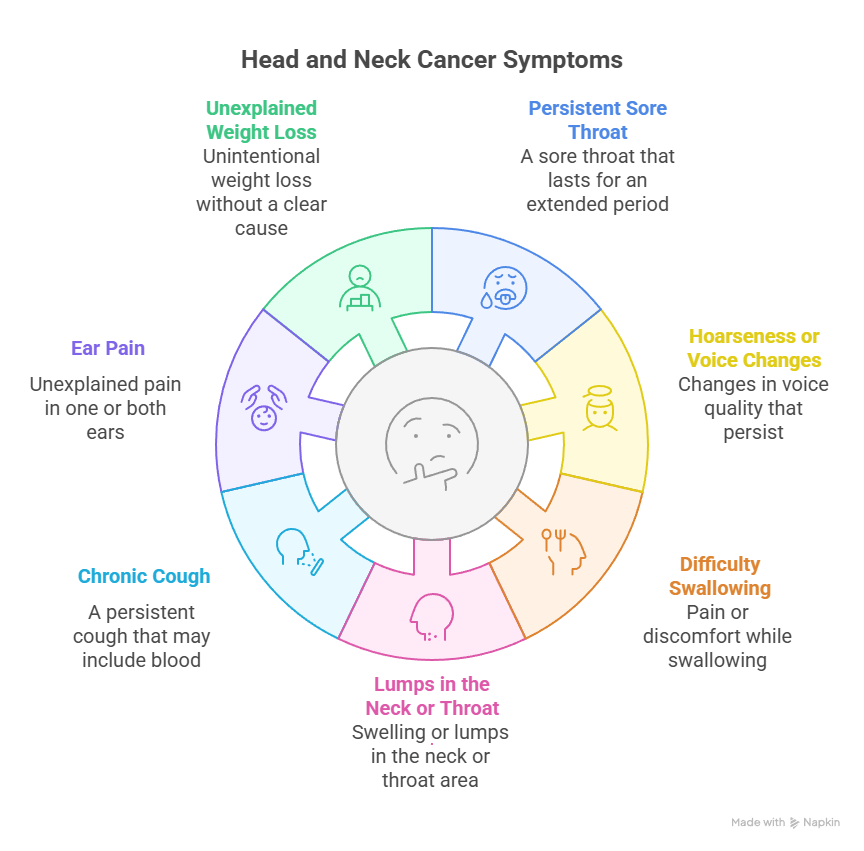
Head and Neck Cancer
Head and Neck Cancer Treatment in India
Overview
Head and neck cancer is a serious and complex condition that significantly impacts a person’s ability to speak, swallow, and breathe. Given the intricacies of this disease, it requires expert treatment and a multidisciplinary approach. Head and Neck Cancer Treatment in India is known for its state-of-the-art facilities and comprehensive care, ensuring that each patient receives personalized treatment tailored to their specific needs. From early-stage diagnosis to advanced treatment plans, specialists in India are committed to providing the highest standards of care to help patients recover with compassion and expertise.
What is Head and Neck Cancer?
Head and neck cancer refers to a group of cancers that affect the mouth, throat, larynx (voice box), and other parts of the head and neck region. These cancers often begin in the squamous cells that line the mucosal surfaces of the head and neck. Early detection is critical for effective treatment, making it essential to consult an experienced Head and Neck Cancer Specialist in India for a comprehensive evaluation. Head and neck cancer includes cancers such as oral cancer, pharyngeal cancer, laryngeal cancer, and cancer of the nasal cavity and salivary glands.
Types of Head and Neck Cancer

Head and neck cancers are categorized based on their location and the cells they affect. The primary types of head and neck cancer include:
Oral Cancer: Affects the mouth, gums, tongue, and lips.
Pharyngeal Cancer: Includes cancers of the nasopharynx, oropharynx, and hypopharynx.
Laryngeal Cancer: Occurs in the larynx (voice box) and can affect speaking and breathing.
Sinus and Nasal Cavity Cancer: Develops in the nasal passages and sinuses.
Salivary Gland Cancer: Affects the salivary glands, which can disrupt normal oral functions.
Each type of head and neck cancer requires unique treatment strategies, highlighting the need for an experienced Head and Neck Cancer Specialist in India who can provide specialized care.
Head and Neck Cancer Causes
Several factors have been linked to the development of head and neck cancer. These factors include:
Tobacco Use: Smoking or using smokeless tobacco is a major risk factor for head and neck cancer.
Excessive Alcohol Consumption: Drinking alcohol, especially in combination with smoking, greatly increases the risk.
Human Papillomavirus (HPV): Certain HPV strains are linked to cancers of the oropharynx, a type of head and neck cancer.
Poor Nutrition: Diets lacking in essential nutrients, such as fruits and vegetables, may increase the risk of cancer.
Exposure to Carcinogens: Long-term exposure to harmful chemicals, such as asbestos or industrial pollutants, is a major contributor.
Chronic Acid Reflux (GERD): Repeated acid reflux can cause damage to the throat lining, potentially leading to cancer.
By identifying and addressing these causes, individuals can reduce their risk of developing head and neck cancer, enabling early intervention and better outcomes with Head and Neck Cancer Treatment in India.
Head and Neck Cancer Symptoms

The symptoms of head and neck cancer can vary depending on the type and stage of the disease. Common symptoms include:
Persistent Sore Throat: A sore throat that does not go away.
Hoarseness or Voice Changes: Prolonged voice changes, such as hoarseness.
Difficulty Swallowing: Pain or discomfort while swallowing food or liquids.
Lumps in the Neck or Throat: Persistent lumps or swelling in the neck or throat.
Chronic Cough: A cough that continues, sometimes with blood.
Ear Pain: Unexplained pain in one or both ears.
Unexplained Weight Loss: Unintentional weight loss without an obvious cause.
If any of these symptoms are persistent, it is essential to seek expert guidance from a Head and Neck Cancer Specialist in India for accurate diagnosis and treatment.
Head and Neck Cancer Diagnosis
Diagnosing head and neck cancer involves various methods to confirm the presence of the disease and determine its extent. Key diagnostic steps include:
Physical Examination: The doctor checks for abnormalities in the throat, mouth, and neck.
Imaging Tests: CT scans, MRIs, PET scans, and X-rays help determine tumor size, location, and spread.
Biopsy: A tissue sample is collected and analyzed to confirm the presence of cancer cells.
Endoscopy: A thin tube with a camera is inserted into the throat for a closer view of the affected areas.
HPV Testing: In cases of oropharyngeal cancer, testing for HPV is recommended.
These diagnostic methods are crucial for creating an individualized treatment plan for Head and Neck Cancer Treatment in India.
Head and Neck Cancer Stages
Head and neck cancer is staged based on its size, location, and spread. The stages are:
Stage 0: The cancer is confined to abnormal cells that have not spread.
Stage I-II: The tumor is small and localized, with no lymph node involvement.
Stage III: The tumor has grown larger and may have spread to nearby lymph nodes.
Stage IV: The cancer has spread to distant parts of the body or to other tissues, with subcategories based on the extent of spread.
Staging helps doctors plan the most effective treatment for head and neck cancer and is essential for a successful recovery plan with Head and Neck Cancer Treatment in India.
Head and Neck Cancer Treatment
The treatment for head and neck cancer depends on the cancer’s type, stage, and location. Common treatments include:
Surgery: Tumors are removed surgically, including partial or total removal of the voice box (larynx) or pharynx.
Radiation Therapy: Radiation is used to target and destroy cancer cells, either alone or in combination with surgery.
Chemotherapy: Drugs are used to kill cancer cells or shrink tumors, often combined with radiation for better results.
Targeted Therapy: Drugs target specific molecules involved in cancer cell growth, such as EGFR inhibitors.
Immunotherapy: This treatment boosts the immune system to help fight cancer, often used for recurrent or advanced cases.
A multidisciplinary approach ensures that patients receive personalized treatment for Head and Neck Cancer Treatment in India, maximizing their chances of recovery.
Why Choose Dr. Vijay Anand Reddy for Head and Neck Cancer Treatment in India?
Dr. Vijay Anand Reddy is a renowned Head and Neck Cancer Specialist in India, providing comprehensive, personalized treatment for patients battling head and neck cancers. With years of experience and a deep commitment to patient care, Dr. Reddy uses the latest techniques and advanced technologies to treat cancers in the head and neck region effectively. His holistic, patient-centric approach ensures the highest quality of care for each individual.
For Head and Neck Cancer Treatment in India, trust Dr. Vijay Anand Reddy’s expertise to guide you through every step of your treatment, ensuring the best possible outcomes and a healthier tomorrow.
FREQUENTLY ASKED QUESTIONS
The best treatment for head and neck cancer depends on factors such as the cancer’s type, stage, location, and the patient’s overall health. Common treatments include surgery to remove tumors, radiation therapy to target and destroy cancer cells, chemotherapy to kill cancer cells or shrink tumors (often combined with radiation), targeted therapy that focuses on specific molecules involved in cancer growth, and immunotherapy to enhance the immune system’s ability to fight cancer. A personalized, multidisciplinary approach using a combination of these treatments is often the most effective way to manage head and neck cancer.
Neck cancer can be cured completely if detected early and treated effectively. Treatment options like surgery, radiation, and chemotherapy offer high success rates in early stages.
The survival rate for head and neck cancer varies depending on the cancer’s type, stage at diagnosis, and the patient’s overall health. Generally, the five-year survival rate for localized head and neck cancers is around 80%, meaning most patients diagnosed with early-stage cancer can live for five or more years after treatment. However, the survival rate decreases significantly for more advanced stages, particularly if the cancer has spread to distant parts of the body. Early detection and timely treatment greatly improve the chances of survival, making regular screenings and professional evaluation crucial for better outcomes.
As with any medical procedure, there are risks, but we adhere to stringent safety protocols to minimize them.
We prioritize preserving these functions; however, outcomes depend on the tumor’s location and size.

